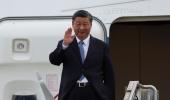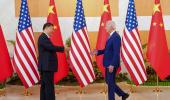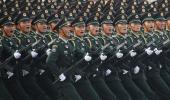United States President Joe Biden and his Chinese counterpart Xi Jinping have agreed to resume high-level military-to-military communication and counter-narcotics cooperation as they met for four hours in a bid to establish a working relationship amidst Beijing's aggressive actions in the Indo-Pacific region.

The two leaders also affirmed the need to address the risks of advanced artificial intelligence (AI) systems and improve AI safety through US-China government talks during their meeting on the sidelines of the Asia-Pacific Economic Cooperation summit in San Francisco.
Biden said since their last meeting in Bali, on the sidelines of the G20, the key members of the two governments have had important discussions on issues that matter to both the nations and to the world.
"But as always, there's no substitute for face-to-face discussions. I've always found our discussions straightforward and frank, and I've always appreciated them," Biden said.
Observing that he has known Xi for a long time, Biden said they haven't always agreed, which was not surprising to anyone.
"But our meetings have always been candid, straightforward, and useful. I've never doubted what you've told me in terms of your candid nature in what you speak. I value our conversation because I think it's paramount that you and I understand each other clearly, leader to leader with no misconceptions or miscommunication," said the US president.
The two leaders exchanged views on key regional and global challenges, the White House said.
'President Biden underscored the United States' support for a free and open Indo-Pacific that is connected, prosperous, secure, and resilient. The President reaffirmed the United States' ironclad commitment to defending our Indo-Pacific allies. The President emphasised the United States' enduring commitment to freedom of navigation and overflight, adherence to international law, maintaining peace and stability in the South China Sea and East China Sea, and the complete denuclearisation of the Korean Peninsula,' it said.
While the Chinese official media has announced the agreements reached between Xi and Biden, the Chinese leader in opening remarks at his meeting with the US President pitched for reducing the stifling tensions between the top two economies, especially at a time when the Chinese economy was facing a slowdown which his government is struggling to fix.
"It is unrealistic for one side to remodel the other. Conflicts and confrontations have unbearable consequences for both sides. I'm still of the view that major country competition is not the prevailing trend of current times and cannot solve the problems facing China and the United States," Xi said.
Xi also spoke of his concerns about the US policy towards Taiwan.
The Taiwan issue has always been the most important and sensitive issue in Sino-US relations, the US should hold on to its promise of not supporting 'Taiwan independence', stop arming Taiwan, and support China's peaceful reunification, Xi told Biden.
"China will eventually be reunified and will inevitably be reunified," Xi said, according to an official press release in Beijing.
On Taiwan, Biden repeated to Xi that he would not change the one-China policy, which he said previous US presidents had also upheld.
He said he believes China will not interfere in the upcoming Presidential elections in Taiwan.
"I didn't expect any interference, any at all. We had that discussion as he was leaving," Biden said.
For his part, Xi called on the United States to 'not scheme to suppress or contain China' during Wednesday's extensive talks, Chinese state media reported.
"China has no plans to surpass or unseat the United States, and the United States should not scheme to suppress or contain China," Xi said.
Biden was asked, given that his relationship with Xi goes back more than a decade, whether he trusted him.
"I trust but verify, as the old saying goes," he said.
"We're in a competitive relationship, China and the United States, but my responsibility is to make this rational and manageable so it doesn't result in conflict."
In his opening comments, Xi called on China and the US to find the right way to get along with each other.
The problems facing human society cannot be solved without cooperation between major countries, Xi told Biden, according to an official press release here.
Both the countries should lead by example, step up coordination and cooperation on international and regional issues, and provide more public goods for the world, he said.
The two sides should keep their initiatives open to each other, or coordinate and connect them for synergy, Xi said.
He also said both countries should jointly manage disagreements effectively.
Disagreements should not be a chasm that keeps the two countries apart. Instead, the two sides should look for ways to build bridges to help them walk toward each other, Xi said.
It is important that both sides appreciate each other's principles and red lines, and refrain from flip-flopping, being provocative, and crossing the lines, Xi said, adding that the two countries should have more communications, more dialogues and more consultations, and calmly handle their differences as well as accidents.
"However as long as they respect each other, coexist in peace and pursue win-win cooperation, they will be fully capable of rising above differences and find the right way for the two major countries to get along with each other," Xi said, expressing his firm belief in a promising future of the bilateral relationship.
Noting that a year has passed since their last meeting in Bali, Indonesia, and a lot has happened since then, Xi said the world has emerged from the COVID-19 pandemic but is still under its tremendous impacts.
"The global economy is recovering, but its momentum remains sluggish; industrial and supply chains are still under the threat of interruption; and protectionism is rising. All these are grave problems," Xi said.
Xi said that the China-US relationship has never been smooth sailing over the past 50 years and more and that it always faces problems of one kind or another. Yet it has kept moving forward amid twists and turns.
"For two large countries like China and the United States, turning their back on each other is not an option. It is unrealistic for one side to remodel the other. And conflict and confrontation have unbearable consequences for both sides," he said.
He underscored his consistent view that major-country competition is not the prevailing trend of current times and cannot solve the problems facing China and the United States or the world at large.
"Planet Earth is big enough for the two countries to succeed, and one country's success is an opportunity for the other," he noted.
Xi said being at the helm of China-U.S. relations, he and President Biden shoulder heavy responsibilities for the two peoples, for the world and for history.
While both sides maintained that the talks went well, Biden answering a question hours after the talks said he still believes his earlier assertion that Xi is a 'dictator', a comment that could upset Beijing.
"Well, look, he's a dictator in the sense that he is a guy who runs a country that is a communist country that's based on a form of government totally different than ours. Anyway, we made progress," he said.
"I know the man, I know his modus operandi, I looked into his eyes -- we have disagreements. He has a different view than I have on a lot of things, but he's been straight. I don't mean that good, better, indifferent, just straight," he said.










